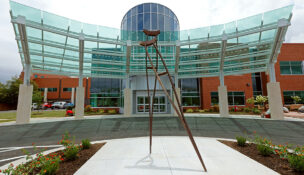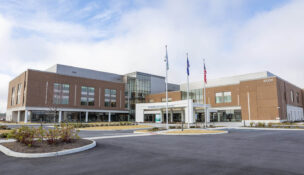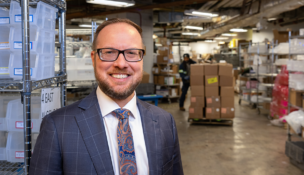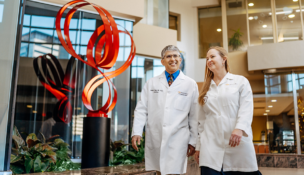Seeking a cure
Nursing shortage has health systems scrambling
Ashley Apple has advice for those hoping to understand the burden nurses face as COVID-19 surges once again while hospitals suffer staff shortages.
“Think of the worst day you’ve ever had at work. Then add in poor staffing and multiple human deaths. Then repeat it every day for 18 months,” she says. “That’s sort of where we are.”
Apple was an emergency room nurse at St. Francis Medical Center in Chesterfield County during the early days of the pandemic. Today, she is a family nurse practitioner with KidMed Pediatric Urgent Care. While her career transition was already in the works, Apple admits that the pressures of COVID-19 hastened her exit.
Also commissioner on government relations for the Virginia Nurses Association, Apple is troubled as she hears from colleagues choosing to leave their hospital jobs.
“This is not sustainable,” Apple says of the rate of turnover among nurses. “We have to do something, or we are going to face dire public health consequences.”
Hospitals across Virginia are struggling to retain and recruit nurses as the pandemic nears the two-year mark.
In its 2021 industry report, national nurse staffing firm Nursing Solutions Inc. found that in its Southeast region, which includes Virginia, turnover among registered nurses working at hospitals during 2020 was 24.6% — a 4.7% increase over the previous year, and higher than the national average of 19.5%.
Amid a COVID-19 surge in recent months, the challenge facing many hospitals has not been having enough licensed beds, but having enough staff members available to care for the patients who occupy those beds, says Julian Walker, vice president of communications for the Virginia Hospital and Healthcare Association.
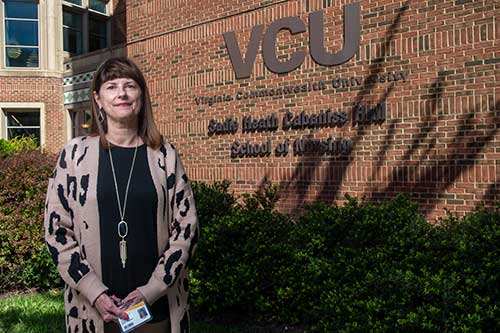
The situation is forcing hospital administrators to make difficult decisions about whether to cancel or delay nonemergency procedures, divert ambulances or hire expensive travel nurses — contract workers who are hired for temporary positions at hospitals around the country.
A chronic problem
While the pandemic has highlighted the nursing shortage, the problem is not new. In 2010, the Virginia Nurses Association published a study warning that by 2020, one in three Virginians would not receive necessary health care because of a shortage of registered nurses.
As the most recent wave of the pandemic floods emergency departments, some in the profession worry that the impact on nurses’ mental health will have ongoing repercussions that will be a long-term burden on this workforce.
“I am seeing a level of post-traumatic stress disorder in individuals now going through the second wave with COVID,” says Linda Shepherd, chief nursing officer at Johnston Memorial Hospital in Abingdon, which is owned by Ballad Health. Shepherd is also president of the Virginia Nurses Association.
Hospital administrators and human resources executives are seeing nurses retire early, transition into nonclinical roles or leave staff jobs for higher-paying travel nurse positions.
“A surprising number are leaving health care altogether, which is really breaking my heart,” says Wendy Horton, CEO of the University of Virginia Medical Center.
The UVA Health system’s voluntary turnover rate among registered nurses this September was 19.1% — significantly higher than the 10% to 12% rate Horton is accustomed to seeing at the hospital. “This is the first time in my career that I have seen this type of turnover,” she says.
“We are seeing the fatigue of this marathon of COVID,” notes Paul Hudgins, senior vice president and chief human resources officer at Carilion Clinic in Roanoke. “Folks are getting out of bedside care and looking at other types of jobs.”
‘Tradeoffs every day’
As a result, hospitals are forced to decide how to allocate their staff.
At Johnston Memorial Hospital, Shepherd says that managers and other nonclinical staff are jumping in to take on tasks such as answering phones, which can free up nurses to focus on caring for an increased patient load.
Several Virginia hospitals have had to request emergency medical services to temporarily divert ambulances to other hospitals, a measure Carilion Roanoke Memorial Hospital took twice in late August and early September, officials told local media outlets. Diversion orders lasted at most four hours.
“Staffing is a big part of it and a big contributor to why you are seeing hospitals and health systems take unprecedented steps,” Hudgins says.
The Old Dominion EMS Alliance, which includes 25 hospitals and 100 emergency
medical services agencies in Central Virginia, operated under “code black” —
meaning at least eight of its member hospitals were diverting ambulances — for an unprecedented 35 consecutive days ending Sept. 22, according to Executive Director Heidi Hooker.
Hooker emphasizes that code black allows ambulance dispatchers to evenly distribute patient load among hospitals that have capacity — but adds that patients with critical issues will always be taken to the nearest hospital.
In late August, UVA Health announced that it was postponing some nonemergency surgeries due to rising patient loads and staffing concerns — a step that other hospitals around the state have also taken during the most recent wave of rising COVID-19 cases.
Horton says this is one of the many options hospital leaders examine daily to manage available resources while also balancing extra work related to the pandemic, such as testing and vaccination drives. “There are tradeoffs every day,” she says.
Meanwhile, the nationwide shortage of nurses has boosted the pay rates for travel nurses as high as $7,000 to $8,000 a week. By comparison, a registered nurse in Virginia earned about $1,488 a week in 2020, according to the U.S. Bureau of Labor Statistics’ mean wage report.
“In Virginia we are not seeing the super-high rates we are seeing in some of the other states, but the nurses are,” says registered nurse Diana Wylie, who is vice president of business development for FlexRN, a Fredericksburg-based nurse staffing agency that’s part of American Medical Staffing. “They see they can make $8,000 to $10,000 a week in Florida or Texas or Louisiana. Now you are pulling on a workforce that maybe wasn’t willing to travel before, but can now go make double or triple their normal wage if they leave Virginia.”
Horton says the salary boost in other states presents problems for hospitals here to attract contracted nurses.
“We can’t even get travelers to come here because they are very attracted to those very high rates and also to the hotspot areas,” Horton says. “Many are breaking their contracts early and going to hotspots.”
For staff nurses, watching a temporary employee make multiple times their pay for the same job can be demoralizing, says Apple.
It also highlights a problem that predates the pandemic: Nurses already felt overwhelmed as nurse staffing levels declined in many hospitals in an effort to contain costs.
“Going into the pandemic, they were already burned out, working mandatory overtime — things like that,” Apple says. “It has compounded an already stressful situation.”
A fear of losing even more staffers has caused some Virginia hospitals to stop short of mandating COVID-19 vaccines for their staff members — even as health care officials urge the public to get vaccinated to stop the spread of the coronavirus.
So far, Carilion Clinic has not mandated vaccinations for employees, but has instead strongly encouraged it, even offering $150 bonuses for employees to get vaccinated by Oct 1. “Staffing was a part of that discussion,” Hudgins acknowledges. “If there was a statewide mandate, obviously we would do that. If all of our brethren in health care went down this path, I think we would have gone down that path as well.”
Meanwhile, HCA Healthcare, which runs 13 hospital campuses and dozens of smaller facilities in Virginia, and Ballad Health, which operates seven hospitals in Southwest Virginia, also have stopped short of requiring shots among employees.
Other health systems — including Inova Health System, Virginia Commonwealth University Health System, UVA Health and Valley Health — have all mandated vaccinations.
In Hampton Roads, the region’s major health care employers — Chesapeake Regional Healthcare, Children’s Hospital of The King’s Daughters, Riverside Health System and Sentara Healthcare — set a deadline of Nov. 1.
This patchwork of policies may soon be moot, however. The Biden administration was expected in October to issue guidelines requiring vaccinations for workers in most health care settings that receive Medicare or Medicaid reimbursement, including hospitals. The mandate is anticipated to require vaccinations for the majority of health care workers.
Building a better pipeline
Shelley Conroy, associate dean of graduate programs at VCU’s School of Nursing, says she is seeing continued interest in nursing degrees, especially the advanced degrees VCU offers. “Applications are up, to the point that we can’t handle all of the students.”
Two challenges, however, are hiring enough faculty to teach these future nurses — nurses with advanced degrees can earn more money in practice than in academia — and providing students with clinical placements required for the degrees.
VCU has tried to bridge this gap by sharing the pool of nurses with advanced degrees with the university health system. These nurses spend 40% of their time teaching and 60% in clinical work.
In Charlottesville, Piedmont Virginia Community College is working to increase the number of nursing graduates from 100 to 150 per year, working closely with U.Va. to create a smoother pipeline of nurses ready to work.
The 50 new graduates would start work in January instead of August, to provide a more consistent stream of new employees to area hospitals. But the plan is contingent on hiring two new nursing instructors.
“We are searching right now,” PVCC President Frank Friedman says. “It is very difficult to find qualified nursing faculty.” He also notes that while PVCC typically receives 250 to 300 applications for its 100 nursing spots, the pandemic may have an impact on student interest.
“We have seen some current students withdraw from our program out of fear,” he notes. “They don’t want to work in a hospital. They are afraid to expose themselves to COVID. We [also] had about seven individuals withdraw this semester because vaccinations are mandatory” at area hospitals.
Apple, Shepherd and others say that in order to attract and retain nurses, employers need to offer more professional respect, increased mental health support and decreased nurse-to-patient ratios.
While many hospitals are adding mental health resources and experimenting with more flexible scheduling, Horton admits that compensation is a challenge.
In October, UVA Medical Center announced that the health system would commit more than $30 million during the 2022 fiscal year to increase compensation and make market pay adjustments for much of its workforce.
Dorrie Fontaine, former dean of the U.Va. School of Nursing, says she has been getting calls from many hospitals, asking her to talk to their staff about managing stress and anxiety. She recently published a book, “Self Care for New and Student Nurses.”
“Self-care is great,” she says, but hospitals can greatly help their recruitment and retention efforts by ensuring that nurses are supported with adequate staffing and appropriate recognition for the work they do. “Until you have hospital systems who treat nurses with the respect and dignity they deserve, all the yoga in the world is not going to be enough.”
Apple also worries that the current stresses on nurses will have long-lasting impacts on the health care workforce if these professionals aren’t better supported with adequate staffing and appropriate recognition for the work they do.
“We didn’t sign up to be soldiers. We are caretakers,” she says. “We have found ourselves on a battlefield, and we need help.”
e



